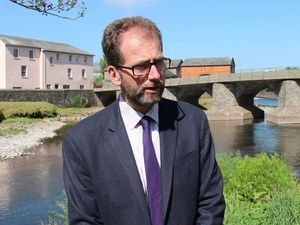Councils in Wales are bracing themselves for a multi-million pound “black hole” when they prepare their budgets for next year
Councils in Wales are bracing themselves for a multimillion pound “black hole” when they prepare their budgets for next year.
Rises in central government grants have not kept pace with soaring costs to run and maintain essential services, opening up huge projected budget gaps in councils’ finances.
Every council which responded to the Local Democracy Reporting Service (LDRS) this week reported they would have to make millions in savings next year.
Among the gloomiest forecasts are Cardiff Council, which is facing a £49.7m shortfall in next year’s budget, followed by Caerphilly (£33m), Pembrokeshire (£25m) and Neath Port Talbot (£23m).
Powys County Council estimates £17.4m savings will need to be made next year, and between £62m and £85m over the next five years. The council holds £13.6m in unallocated reserves.
Ceredigion Council is anticipating a budget gap of £8m for 2025/26, and has £6.7m in its general balances and £44m in its earmarked reserves.
A spokesperson for Gwynedd Council said: “£3.5m worth of savings has already been approved for the 2025/26 financial year, and a further £343,000 in 2026/27. Further savings are also under consideration..”
The Welsh Local Government Association (WLGA) has warned pressure is “unsustainable” and urged decision-makers in the Senedd and in Westminster to “step up” with more investment.
Central government grants make up the majority of council funding in Wales.
The situation in Caerphilly is one of the worst of the nation’s 22 local authorities, and leaders there anticipate they will have to plug a £33m hole in next year’s budget, and another £12m the year after that.
Caerphilly County Borough Council leader Sean Morgan said tough decisions would have to be made to protect key services like education and social services.
Other council responsibilities such as parks, libraries, community centres and leisure could all face cuts, closures or reforms as a result.
Cllr Morgan said some other councils in Wales are “down to four or five million” in reserves and are “pretty close” to issuing Section 114 notices – effectively declaring bankruptcy and calling in external commissioners to balance the books.
Andrew Morgan, who leads the WLGA, warned that “without extra funding to maintain services, councils will struggle to maintain the services that our communities need”.
“The WLGA has emphasised that, despite these challenges, councils remain committed to supporting their residents and working with Welsh Government to help deliver their priorities, but with budget pressures on the rise, it’s really important for both the Welsh and UK governments to step up and provide the investment we need to keep these essential services running,” he added.
A Welsh Government spokesperson said: “We recognise the very real challenges local authorities are facing.
“We meet regularly with local authorities to discuss these against the backdrop of the current financial climate, as we prepare our own draft budget for 2025/26.”
The figures come amid the revelation the Welsh Government is drawing up plans in case Welsh councils go bust.
Peter Fox MS, Welsh Conservative Shadow Minister for Finance and Local Government said: “This should be an impossible prospect for councils, but after 25 years of Labour’s outdated funding formula, there is a real possibility of Welsh councils declaring bankruptcy.
“At least two Welsh councils are sounding alarm bells, they must be listened to, with bold action taken where necessary.
“It’s time for a fundamental rethink of how the Welsh Labour Government fund our councils, the current method is not fit for purpose and must be replaced with a new system that is fair for all councils so that essential public services can be maintained across all of Wales.”




